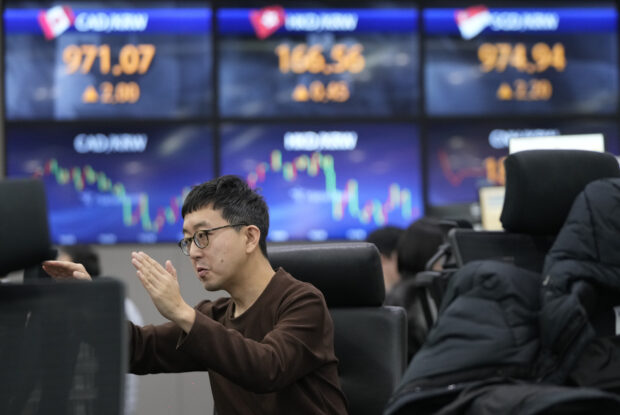World shares mostly lower as BOJ meets, China property shares fall

A currency trader gestures at the foreign exchange dealing room of the KEB Hana Bank headquarters in Seoul, South Korea, Monday, Dec. 18, 2023. Asian shares were mostly lower on Monday as the Bank of Japan began a 2-day meeting that is being watched for hints of a change to the central bank’s longstanding near-zero interest rate policy. (AP Photo/Ahn Young-joon)
BANGKOK — World shares were mostly lower on Monday, while U.S. futures and oil prices edged higher.
Germany’s DAX slipped 0.3 percent to 16,699.58 and in Paris, the CAC40 fell 0.5 percent to 4,066.69. Britain’s FTSE 100 rose 0.2 percent to 7,592.11.
The futures for the S&P 500 and the Dow Jones Industrial Average edged 0.1 percent higher.
The Bank of Japan began a 2-day meeting that investors are watching for hints of a change to the central bank’s longstanding near-zero interest rate policy.
Investors have been speculating for months that rising prices would push Japan’s central bank to finally shift away from its lavishly lax monetary policy. But the meeting that ends Tuesday is not expected to result in a major change.
READ: Softening consumption may delay BOJ’s exit from easy policy
Tokyo’s Nikkei 225 index lost 0.6 percent to 32,758.98, while the U.S. dollar edged higher against the Japanese yen, rising to 142.36 from 142.11.
The BOJ has kept its benchmark rate at minus 0.1 percent for a decade, hoping to goose investments and borrowing to help drive sustained strong growth.
One aim is to get inflation to a target of 2 percent after many years of falling prices. But while inflation has risen, wages have failed to keep up, and central bank Governor Kazuo Ueda has remained cautious about major moves at a time of deep uncertainty about the outlook for the global economy.
Meanwhile, renewed selling of property shares pulled Chinese stocks lower.
READ: China’s property foreclosures up by a third so far in 2023
Hong Kong’s Hang Seng lost 1 percent to 16,629.23 and the Shanghai Composite index sank 0.4 percent to 2,930.80.
Debt-laden developer Country Garden lost 2.4 percent , while China Evergrande declined 1.3 percent . Sino-Ocean Group Holding shed 2.2 percent .
Elsewhere in Asia, Australia’s S&P/ASX 200 declined 0.2 percent to 7,426.40. South Korea’s Kospi added 0.1 percent to 2,566.86 and Bangkok’s SET was down 0.3 percent .
US stock market
On Friday, the S&P 500 finished down less than 0.1 percent and was hanging within 1.6 percent of its all-time high set early last year, and it closed out a seventh straight winning week for its longest such streak in six years.
The Dow Jones Industrial Average, which tracks a smaller slice of the U.S. stock market, rose 0.2 percent and set a record for a third straight day. The Nasdaq composite climbed 0.4 percent.
“As the S&P approaches record levels, market participants appear undaunted. The prevailing sentiment seems to be that there is no compelling reason to fade this rally until concrete evidence surfaces indicating significant economic or inflation headwinds,” Stephen Innes of API Asset Management said in a commentary.
Stocks overall bolted higher last week after the Federal Reserve seemed to give a nod toward hopes that it has finished with raising interest rates and will begin cutting them in the new year.
READ: With rate hikes likely done, Fed turns to timing of cuts
Lower rates not only give a boost to prices for all kinds of investments, they also relax the pressure on the economy and the financial system.
The Fed’s goal has been to slow the economy and grind down prices for investments enough through high interest rates to get inflation under control. It then has to loosen the brakes at the exact right time. If it waits too long, the economy could fall into a painful recession. If it moves too early, inflation could reaccelerate and add misery for everyone.
Inflation peaked in June 2022 at 9.1 percent , the most painful inflation Americans had experienced since 1981.
A preliminary report on Friday indicated growth for U.S. business activity may be ticking higher. It cited “looser financial conditions,” which is another way of describing market movements that could encourage businesses and people to spend more.
The Congressional Budget Office said Friday it expects inflation to nearly hit the Federal Reserve’s 2 percent target rate in 2024, as overall growth slows. Unemployment is expected to rise into 2025, according to updated economic projections for the next two years.
In other trading early Monday, U.S. benchmark crude oil rose 60 cents to $72.03 per barrel in electronic trading on the New York Mercantile Exchange. It fell 15 cents to $71.43 on Friday.
Brent crude, the international standard, picked up 59 cents to $77.14 per barrel.
The euro rose to $1.0922 from $1.0897.